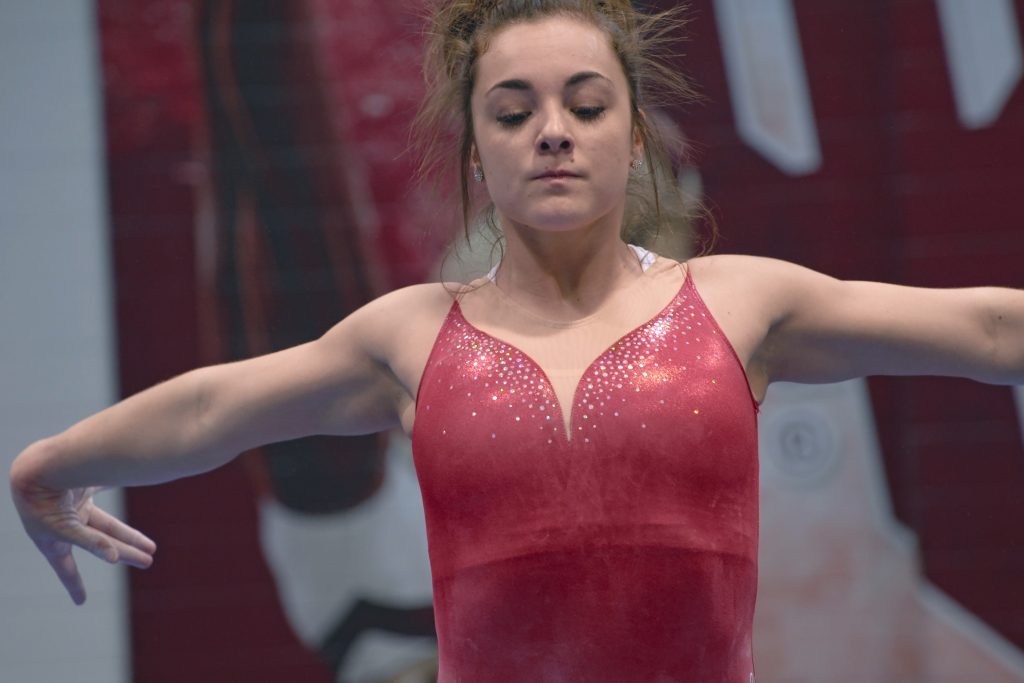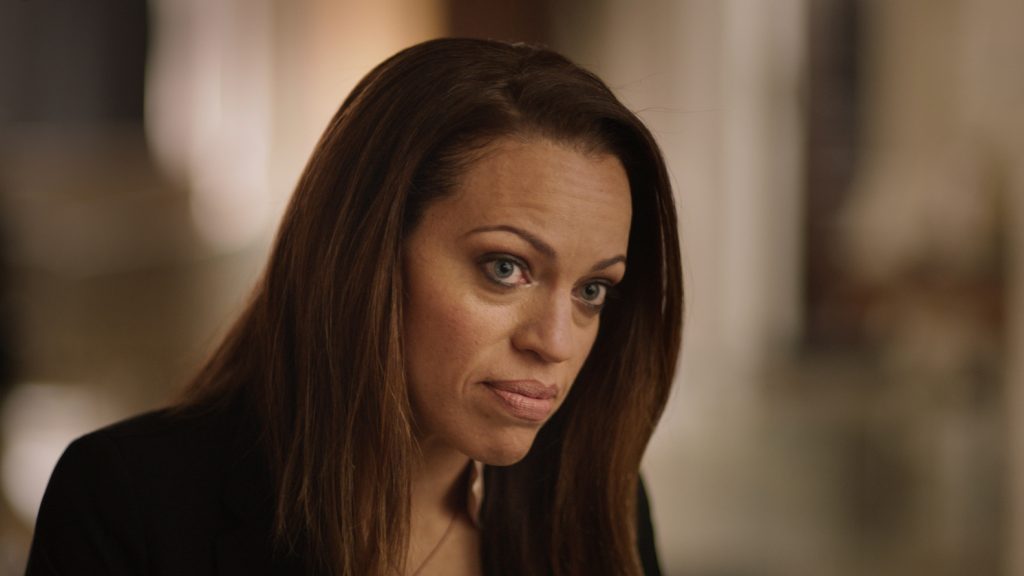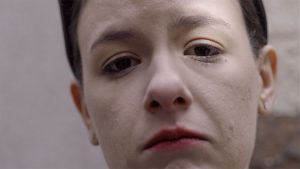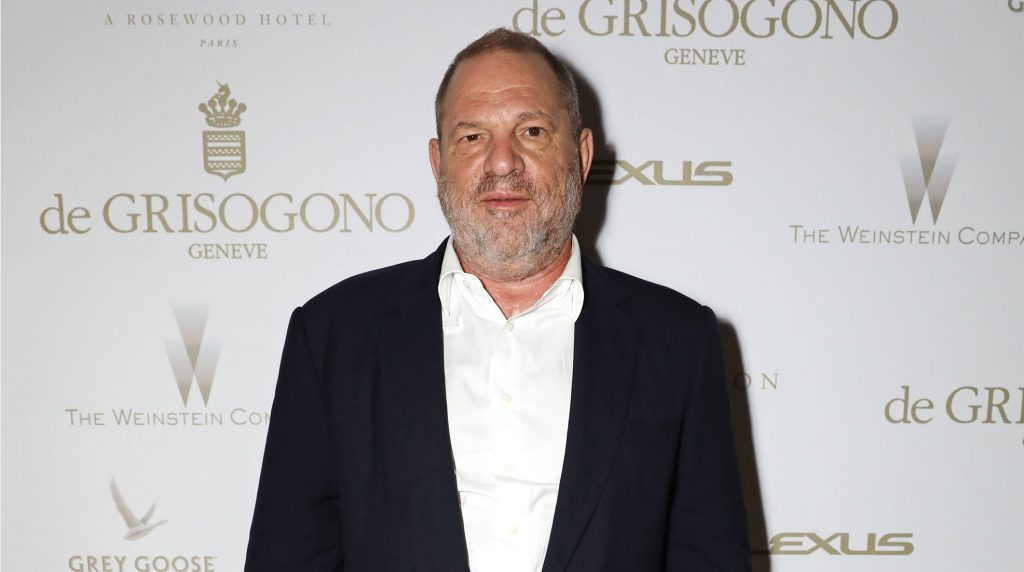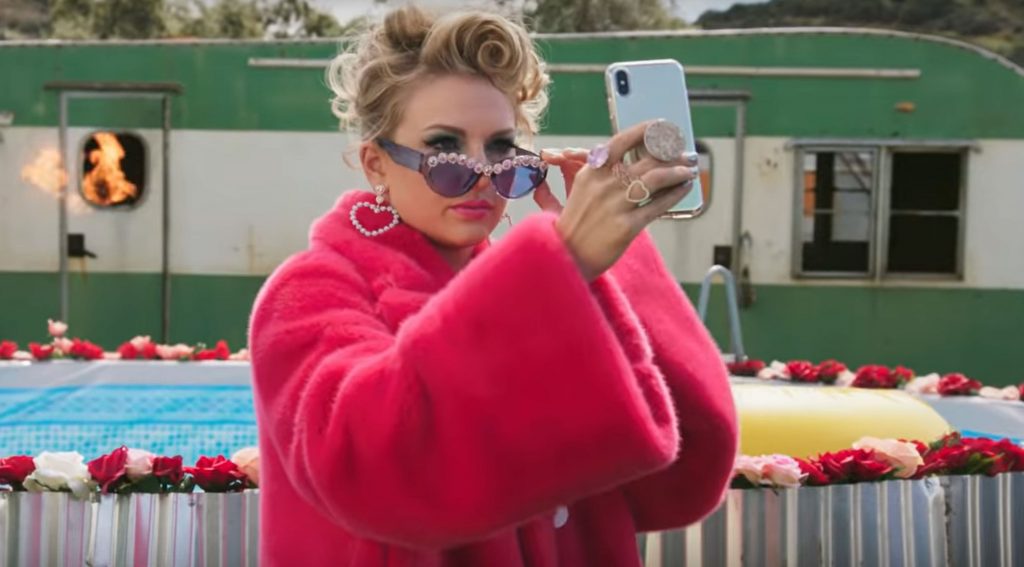March 17, 2021
by Carla Hay
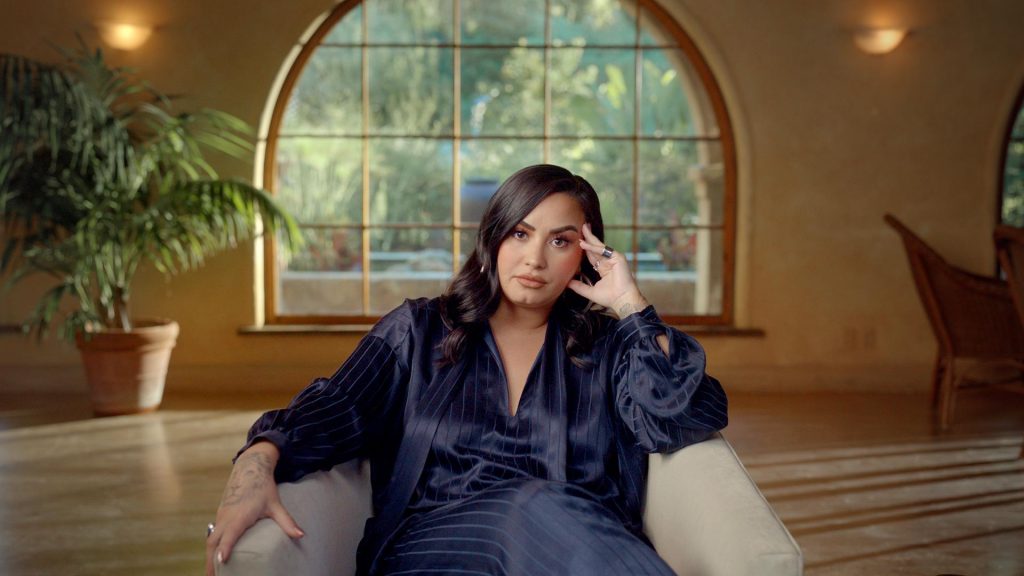
“Demi Lovato: Dancing With the Devil”
Directed by Michael D. Ratner
Culture Representation: The four-part docuseries “Demi Lovato: Dancing With the Devil” features a racially diverse group of people (Latino, white and African American) of mostly people in the entertainment industry, including Demi Lovato, discussing her life and career, particularly from 2018 to 2020.
Culture Clash: Lovato, who is a recovering drug addict, relapsed and had a near-fatal overdose in 2018, and she says that she no longer believes that complete drug abstinence is the best method of recovery for her.
Culture Audience: “Demi Lovato: Dancing With the Devil” will appeal primarily to people who are interested in stories about how celebrities cope with addiction and trauma.

Singer/actress Demi Lovato is well-known for revealing a lot of painful and unflattering aspects of her life, so it should come as no surprise that her four-part YouTube docuseries “Demi Lovato: Dancing With the Devil” has a confessional tone to it. The docuseries had its world premiere at the 2021 South by Southwest (SXSW) Film Festival. Among other things, Lovato goes into details about what she experienced before and after her near-fatal drug overdose at her Los Angeles home in July 2018. (She has since moved from that house because of the bad memories.) She also reveals publicly for the first time that she’s a rape survivor and how the COVID-19 pandemic quarantine led to her very quick and ultimately failed engagement to actor Max Ehrich.
Directed by Michael D. Ratner, “Demi Lovato: Dancing With the Devil” has much more disturbing revelations than Lovato’s 2017 YouTube documentary film “Demi Lovato: Simply Complicated.” There’s a trigger warning at the beginning of “Demi Lovato: Dancing With the Devil” because it contains graphic talk of sexual assault, her drug use and eating disorders. She goes into details about what happened before and after her overdose of heroin laced with Fentanyl.
Lovato says that the drug dealer who supplied the drugs also sexually assaulted her and left her for dead. She also reveals that when she was 15, she lost her virginity by being raped by someone she worked with in her Disney Channel days. Lovato doesn’t name either of her alleged rapists, but she says that when she reported her underage rape to adults, nothing happened to her alleged rapist. And she claims that she’s managing her addiction problems by drinking alcohol and smoking marijuana. That’s not a good sign that she’s on the road to a healthy recovery.
It’s a big contrast to “Demi Lovato: Simply Complicated,” where her most personal revelation was that she’s openly living her life as a member of the LGBTQ community. (The movie had scenes of her discussing her attempts to find love on online dating sites.) Lovato refuses to label her sexuality, and she will only describe herself as “queer” or “not straight.”* “Demi Lovato: Dancing With the Devil” shows that although Lovato claims to be in a much better emotional place than she was in 2018, she’s still struggling with the idea that her recovery from addiction means that she has to completely abstain from drugs and alcohol.
She admits to drinking alcohol and smoking marijuana “in moderation,” even though she’s said in many interviews that she’s an alcoholic and drug addict. Although she talks a lot about the drugs that she’s used and/or been addicted to over the years, in “Demi Lovato: Dancing With the Devil” she leaves out any mention of her alcoholism. And that omission is probably because she keeps repeating in the documentary that she’s tired of other people controlling her life and telling her what she can and cannot put in her body.
Ever since former Disney Channel star Lovato first went to rehab in 2010, at the age 18, she has publicly talked about her recovery from a variety of issues, including drug addiction, alcoholism, eating disorders (anorexia and bulimia), self-harming (cutting) and bipolar disorder. In “Demi Lovato: Simply Complicated,” she repeated the claim that she was clean and sober since 2012. And in 2018, during her “Tell Me You Love Me” tour, she was filming another documentary about herself, until her drug overdose resulted in shutting down production of that untitled documentary, which was permanently shelved.
“Demi Lovato: Dancing With the Devil” has some clips from that never-seen-before 2018 documentary that shows a seemingly happy Lovato on tour. But as is often the case with entertainers who are drug addicts, they are very skilled at hiding dark sides of their lives. In “Demi Lovato: Dancing With the Devil,” Lovato says of her shelved 2018 biographical film: “In that documentary, I was allowing the cameras to see the tip of the iceberg.”
“Demi Lovato: Dancing With the Devil” opens with Lovato backstage during that 2018 tour, in footage that was taken one month before her overdose. She’s on the phone with her mother, Dianna De La Garza. Her mother gushes, “Demi, that was the best show you’ve ever done! It’s only going to get better from here.” Lovato gives a small smile but there’s some sadness in her eyes.
There’s also a clip from a concert earlier on that 2018 tour, with the footage showing Demi being congratulated on stage by opening acts DJ Khaled and Kehlani for her sixth “sober birthday,” to celebrate her being clean and sober for the past six years. On the surface, Lovato looked healthy and happy. But in “Demi Lovato: Dancing With the Devil,” she now confesses that she relapsed later that night.
Lovato says, “I picked up a bottle of red wine that night and it wasn’t even 30 minutes before I called someone that had drugs on them … I’m surprised that I didn’t OD that night. I ended up at a party and ran into my old drug dealer from six years before. That night I did drugs I had never done before.”
According to Lovato, she did a dangerous mix of methamphetamine, Ecstasy, alcohol and OxyContin. “That alone should’ve killed me,” Lovato adds. She also confesses that during this relapse that lasted for months, she tried crack cocaine and heroin for the first time.
The first time she went to rehab in 2010, Lovato says that she was addicted to cocaine and Xanax. Years later, when she turned to crack cocaine and heroin (which she usually smoked, not injected), Lovato says in the documentary that she was trying to get the same “upper/downer” combination feeling that she had with cocaine and Xanax. “Demi Lovato: Dancing With the Devil” includes a photo identified as Lovato on crack for the first time and a photo of her while she was smoking heroin.
Lovato says she quickly became addicted to crack and heroin, but she was able to hide these addictions from most of the people who were close to her. Her immediate family members are interviewed in the documentary: mother Dianna De La Garza; stepfather Eddie De La Garza; older sister Dallas Lovato; and younger half-sister Madison De LaGarza. All of them say some variation of how Lovato is very good at keeping secrets and pretending that everything is just fine. “There’s a lot that the public don’t know,” says her stepfather Eddie, who is interviewed while sitting on a couch with his wife Dianna.
Demi’s parents got divorced when she was 2 years old. For years, she has been open about how her biological father Patrick Lovato struggled with mental illness (bipolar disorder, schizophrenia) and drug addiction, and their relationship was fractured for a very long time. Patrick died of cancer in 2013.
In “Demi Lovato: Dancing With the Devil,” she talks about how she still feels trauma over her troubled relationship with her father, whom she says abused her mother Dianna. Demi also says that she feels terrible about how her father died alone. His body, which wasn’t discovered for several days, was so decomposed that there couldn’t be an open casket at his funeral. Demi says that her biggest fear was that he would die alone, and she says she’s still haunted by guilt over it.
As for what led to her relapse and overdose in 2018, Demi comments: “Anytime you suppress a part of yourself, it’s going to overflow. Ultimately, that’s what happened to me in a lot of areas of my life. And it led to my overdose, for sure.” She adds later in the documentary: “I was miserable. I snapped.”
In addition to the issues of abandonment that she had with her father, Demi says she believes that the beauty pageants she entered as a child also had a negative effect on her: “My self-esteem was completely damaged by those beauty pageants.” Demi says that her eating disorders began as a direct result of the pressure she felt to be thin and pretty for the pageants.
Her mother Dianna says in the documentary about Demi’s childhood traumas: “I didn’t know that she needed to work with a professional to work through some of that.” In a separate interview, Demi says, “I crossed the line in the world of addiction. It’s interesting that it took a quarantine to work on this trauma stuff I’ve never really taken the time to dig deep and do the work on.”
To her credit, Demi doesn’t sugarcoat the very real and permanent health damage that her overdose caused: “I had three strokes. I had a heart attack. I suffered brain damage from the strokes. I can’t drive anymore. I have blind spots in my vision. When I pour a glass of water, I’ll totally miss the cup because I can’t see it anymore. I’ve also had pneumonia, because I asphyxiated, and multiple organ failure.”
What happened the night of the overdose has been reported in many media outlets, but the story in this documentary is told by Demi and some other people who were with her in the 24-hour period before and after her overdose. On the evening of July 23, 2018, Demi had been celebrating the birthday of Dani Vitale, who was Demi’s choreographer/creative director at the time.
Demi, Vitale and some other friends went out to nightclubs before heading back to Demi’s house. (The documentary includes phone footage of Vitale and Demi doing a choreographed dance routine on the rooftop.) Vitale, who is interviewed in the documentary, says that she didn’t know that Demi had been using drugs at that time.
That night, Demi begged Vitale to stay overnight at the house, but Vitale declined because she had to go home and feed her dogs and had to get up early the next morning. However, Vitale says as she was driving away from the house with a friend, she told the friend that she had a strange feeling that something wasn’t right. Ultimately, Vitale says that she didn’t stay because of her other obligations and she didn’t want to treat Demi like a child who needed a babysitter.
Demi says that when she was alone in the house, she called her drug dealer and spent the rest of the night doing drugs with him. The documentary includes blurry video surveillance footage of him leaving her house that morning, a few hours before Demi was found unconscious and the ambulance was called. Police later decided not to arrest him for his involvement in this overdose.
Jordan Jackson, a woman who was Demi’s assistant at the time, was the one who found Demi naked, unconscious and surrounded by vomit in Demi’s bed the next morning on July 24, 2018. “There was one point where she turned blue. Her whole body turned blue. I was like, ‘She’s dead for sure,'” Jackson says in the documentary. “It was the craziest thing I had ever seen.”
When Demi woke up at Cedars-Sinai Hospital in Los Angeles, she was legally blind for a short period of time. She didn’t even recognize her younger sister Madison, who chokes up with emotion in the documentary when she remembers that moment: “She looked me dead in the eye and said, ‘Who is that?’ That’s something you never want to hear your sister say.”
Cedars-Sinai neurologist Dr. Shouri Lahiri, who sits next to Demi while he’s interviewed in the documentary, remembers that her oxygen levels were “dangerously low and trending down.” Demi also was put on dialysis to clean her blood, and the tubing had to be stuck through her neck. “It was like a horror movie,” as Dianna De La Garza describes it.
Demi is seated next to Dr. Lahiri when he talks about her hospital treatment. He says he didn’t know why she was famous until about a week after he became her doctor, when he looked her up on the Internet. In the documentary, Dr. Lahiri mentions that he avoided looking up the information earlier because he didn’t want Demi’s celebrity status to affect his medical decisions about her. It’s kind of hard to believe that while she was in the hospital, he didn’t know for the first several days why she was famous, considering all the media coverage about her overdose.
Demi’s stepfather Eddie De La Garza gives a lot of praise to the hospital doctors who helped Demi with her recovery. But no one (not even Demi) is seen or heard in the documentary explicitly thanking Jackson, the person who found Demi and made the crucially important decision to call 911. Jackson admits in her documentary interview that she was afraid that calling 911 would bring a lot of negative publicity for Demi, but Jackson did the right thing and called anyway. Part of the 911 call is played in the documentary, and Jackson is heard asking the 911 operator if the ambulance could not turn on any sirens when it arrived at the house. However, the operator said that there would be ambulance sirens, and 911 operators have no control over that.
Demi says in the documentary, “I’m really lucky to be alive. My doctors said that I had five to 10 minutes [to live before I was found]. Had my assistant not come in, I wouldn’t be here today.” It would’ve been nice for Demi to directly and publicly thank Jackson in the documentary. If Demi did thank her while filming this documentary, it didn’t make it into the movie. And based on the “bare it all” tone of this film, a moment like that wouldn’t be edited out of the film if this thank you really happened while filming.
The documentary also shows that Vitale’s career and reputation were damaged by this overdose, because she was wrongfully blamed for it and wrongfully identified as being a drug buddy of Demi’s. Vitale says she doesn’t do drugs, but she was bullied and harassed by many of Demi’s fans who believed that Vitale was the one who supplied the drugs that Demi took that night. Vitale lost clients because of the overdose scandal. Demi says that her fans who harassed Vitale went too far.
In the documentary, while Vitale is getting her hair and makeup done for the interview, Demi is shown going into the room, hugging Vitale, and telling her that she’s sorry that she didn’t come forward sooner to clear Vitale’s name, but she was still in recovery at the time. Demi also says that she hopes that the documentary will help Vitale set the record straight that Vitale had nothing to do with Demi’s overdose. They seem to be friendly with each other, but it’s clear that Vitale doesn’t want to risk going through this experience with Demi again.
During her interview, Vitale tears up with emotion when she talks about the fallout from Demi’s overdose: “It was the hardest thing I ever had to deal with in my life. I just wanted [Demi] to live … I lost all my teaching jobs. No one wanted to bring their kid to an apparent heroin dealer teacher. I lost all the artists I was working with. No one wanted to deal with the drama … I had to rethink my whole future, all because of someone else’s decision.”
After recovering from her overdose, Demi says she decided she no longer wanted to have a team of people controlling what she ate, or people checking up on her as if she would relapse at any moment. As an example, she says that for her birthdays, her previous management team would only allow her to have watermelon cake. After she fired that management team, Demi says one of the ways she celebrated her freedom from other people telling her what to eat was by having three cakes on her birthday.
After getting rid of her previous management, Demi asked Scooter Braun (who’s most famous for being Justin Bieber’s manager) to become her personal manager. Braun, who is an executive producer of “Demi Lovato: Dancing With the Devil,” is interviewed in the documentary and says that he was skeptical about representing Demi until he met her in person and she won him over. During contract negotiations, Demi says she relapsed and was truthful about it to Braun. Demi says she was sure that after this confession, Braun wouldn’t want to represent her.
But the opposite happened. Braun says that rather than distancing himself from Demi because of the relapse, he wanted to help her. He says his reaction was, “As long as you tell me the truth, we’ll work through it.” Braun also says, “She didn’t need a manager. She needed a friend.”
Demi didn’t get rid of everyone on her business team after the overdose. She gives a lot of credit to her longtime business manager Glenn Nordlinger and head of security/chief of staff Max Lea for helping her through tough times. Nordlinger and Lea are both interviewed in the documentary. Nordlinger says it was his idea to get Demi checked into the Cirque Lodge addiction treatment center in Orem, Utah, for her post-overdose rehab. Demi is seated next to Lea and Nordlinger during some of her interviews, and she often keeps her head lowered, as if she’s still ashamed of what they know about her.
Two other people who’ve remained in Demi’s inner circle and are interviewed in the documentary are Sirah Mitchell (a hip-hop artist) and Matthew Scott Montgomery (an actor), who are each described in the documentary as Demi’s “best friend.” Mitchell is also described as Demi’s “former sober coach.” Mitchell and Montgomery, who were not with Demi on the night that she overdosed, profess unwavering loyalty to Demi. They both say that they knew that Demi was doing heroin and other drugs in the weeks leading up to the overdose, but they say that Demi ignored their concerns and there was nothing they could do about it.
Mitchell and Montgomery seem to be among Demi’s biggest cheerleaders, but they also come across as enablers who will say what she wants to hear so she won’t cut them out of her life. For example, Mitchell and Montgomery make vague excuses for why they’re going along with Demi’s plan to drink alcohol and smoke marijuana as part of her “recovery” from alcoholism and drug addiction. By now, these friends should know that when drug addicts/alcoholics think they can handle drugs and alcohol, that’s still being in the sickness of denial.
As for Demi’s family members, they all say that based on their experiences with Demi, they know that an addict can only truly recover when the addict is willing to stop what’s causing their addiction of their own free will, not because other people are pressuring them to do it. Demi says that the first time she went to rehab, she was forced to go because she was told that she wouldn’t be able to see her sister Madison again if Demi didn’t get rehab treatment. In the documentary, Demi notes the “full circle” irony that after she woke up from her overdose, she literally couldn’t see Madison because of Demi’s temporary blindness.
Demi’s case manager Charles Cook is the one of the few people interviewed in the movie to warn viewers that Demi’s way of handling her addiction is not going to work for everyone. He chooses his words carefully, so as not to offend her, but it’s pretty obvious that he’s conflicted in endorsing Demi’s decision to continue to drink alcohol and use marijuana. Cook and Demi both say that addiction recovery doesn’t have a “one size fits all” solution, and Demi is trying to figure out what works best for her.
The documentary includes interviews with some celebrities who know Demi and have worked with her, including recovering addict/alcoholic Elton John. He is blunt when he comments on addicts/alcoholics who think they can still use their addiction substances as part of their recovery: “Moderation doesn’t work.” However, he praises Demi by saying: “She’s human and she’s adorable and she’s brave.”
Christina Aguilera and Will Ferrell also say good things about Demi. Aguilera says, “She’s just no bullshit when it comes to her spirit and her energy and her laughter.” Lovato and Aguilera teamed up for the duet “Fall in Line,” which was on Aguilera’s 2018 album “Liberation.” The song was also released as a single.
Ferrell says he was inspired to put Demi in his 2020 Netflix comedy movie “Eurovision Song Contest: The Story of Fire Saga” after seeing her emotionally perform “Anyone” at the 2020 Grammy Awards. The Grammy show was her first high-profile performance after her overdose, and she followed it up with another critically acclaimed performance at Super Bowl LIV, where she sang a powerful rendition of “The Star-Spangled Banner.”
Clips of both performances are in the movie, as well as snippets of her performing on tour in 2018 and in the recording studio. Demi says that she wrote and recorded “Sober” while she was in the throes of addiction to crack and heroin. And she mentions that her song “Dancing With the Devil” is one of the rawest, soul-baring songs she’s ever written about her addiction. Braun says, “In the studio, Demi is in her happy place.”
Demi describes her brief engagement to Ehrich in 2020 as part of their whirlwind and unconventional romance. Most of their courtship happened when they moved in with her mother and stepfather to quarantine with them during the coronavirus pandemic. Demi and Ehrich dated for just six months before calling it quits. After the breakup, he went on social media and gave interviews saying that he was blindsided and treated unfairly by Demi.
In the documentary, Demi says that she and Ehrich probably wouldn’t have gotten engaged so quickly if they hadn’t quarantined together. And although she doesn’t divulge the full details of their breakup, Demi reiterates what she’s already said publicly: She says she found out that Ehrich didn’t have the right intentions in their relationship. The documentary has selfie video footage of a forlorn-looking Demi after the breakup, fretting to the camera that she won’t find anyone to love her.
Demi has this to say about her love life at the time she filmed this documentary: “I feel like I’m too queer in my life to marry a man right now.” She describes her outlook: “Life is fluid, and I’m fluid, and that’s all I know.”
In addition to dealing with her physical health problems as a result of the overdose, Demi says she has the psychological trauma of being sexually assaulted. She has this to say about the sexual violation from her drug dealer: “When they found me, I was naked, blue. I was literally left for dead after he took advantage of me. I was literally discarded and abandoned.”
“When I woke up in the hospital, they asked if I had consensual sex,” Demi says in one of her documentary interviews. “There was one flash that I had of him on top of me. I saw the flash, and I said, ‘Yes’ [in answer to the question if the sex was consensual]. It wasn’t until a month after my overdose that I realized, ‘Hey, you weren’t in any state of mind to make a consensual decision.’ That kind of trauma doesn’t go away overnight, and it doesn’t go away in the first few months of rehab either.”
Demi reveals that instead of staying away from the drug dealer whom she says raped her, she actually contacted him again when she relapsed after her overdose. And she says that when they had sex again, she wanted to be the one in control. Instead, Demi says this “revenge sex” made her feel worse.
And she also says it was history repeating itself because something similar happened with the person she says raped her when she was 15: “When I was a teenager, I was in a very similar situation. I lost my virginity in rape. I called that person back a month later and tried to make it right by being in control. All it did was make me feel worse.”
In the documentary, Demi doesn’t name her alleged rapists, but the drug dealer who admitted he was the one who supplied the drugs on the night of the overdose already gave tabloid interviews after he found out that he wouldn’t be arrested for supplying her the drugs. His name is already out there in the public. And in at least one of his interviews, he claimed that Demi was his sex partner in a “friends with benefits” situation.
As for the guy whom Demi says raped her when she was 15, she drops some big hints about who he is. “I was part of that Disney crowd that publicly said they were waiting until marriage.” She says in the documentary that this virginity image was a lie for her and her alleged rapist, which obviously implies that he was part of that “Disney crowd” too.
Commenting on how she lost her virginity, Demi says: “I didn’t have the romantic first time. That was not it for me. That sucked. Then I had to see this person all the time so I stopped eating and coped in other ways.”
Then she takes a breath and says, “Fuck it. I’m gonna say it.” She says that her #MeToo moment came when she reported the rape to adults (whom she does not name in the documentary), but her alleged rapist “never got in trouble for it. They never got taken out of the movie they were in. I always kept it quiet because I’ve always had something to say. I don’t know, I’m tired of opening my mouth. Here’s the tea.”
Just like many people with #MeToo stories, Demi says she’s going public with her truth to help give other people the courage to do the same. “I’m coming forward with what happened to me because everyone it happens to should absolutely speak their voice.” She also says, “At the end of the day, I’m responsible for my life choices and only hold myself accountable. And the last two years have been about me doing the work to identify and confront those traumas, so I can be my best self and truly be happy.”
The problem with these types of “confessions of a famous addict” is that they usually have the celebrity confessing that they previously put on a fake front of being happy and/or sober in public, but they were really miserable and/or relapsing in private. Then they usually end the documentary by saying they’re doing much better now. But it can be hard for people to believe that, when the celebrity has already admitted that they’re skilled at pretending that their life is better than it really is.
Demi says in the “Dancing With the Devil” documentary that when she made the “Simply Complicated” documentary, she was really miserable and pretended at the time that she happy. Is there eventually going to be another “confession” from Demi where she will say that she was lying in this “Dancing With the Devil” documentary too? It’s a vicious cycle where people aren’t going to know what to believe.
Another problem that people tend to have with these celebrity “tell-alls” is they usually come out at around the same time that the celebrity has a new project to promote. And it makes people wonder how much of this pain is being used to market something that the celebrity wants to sell. Sure enough, the documentary includes studio footage and video clips to promote Demi’s seventh studio album “Dancing with the Devil … The Art of Starting Over,” which is due out on April 2, 2021, the same week as when this docuseries’ last episode is released on YouTube.
Most addicts and alcoholics don’t get to profit from selling their stories. And there’s a lot of denial going on in the documentary when Demi, who spent years telling the world that she’s an alcoholic, now says she can handle drinking alcohol in moderation. Did she not learn anything in rehab?
Although there are website addresses and hotline phone numbers listed in the documentary as resources for people who want to get more information on how to get help for addiction or surviving sexual trauma, the mixed messages that Demi gives in her “Dancing With the Devil” documentary can actually confuse people. She does briefly acknowledge that she’s luckier than most addicts, because she can afford top-notch rehab treatment and a team of people who can get her whatever she asks for because she’s paying them to do it. But that acknowledgement rings hollow because she’s basically saying, “I know I can afford to go to the highest-priced rehab centers in the world, but I’m going to indulge in my addictive substances anyway, just because I feel like it.”
However, people who are not gullible fans can see the documentary for what it is: It shows the difficulty of overcoming addiction and how celebrities are surrounded by “yes” people who will say what the celebrity wants to hear so that they can stay in the celebrity’s inner circle. If there’s any meaningful takeaway from “Demi Lovato: Dancing With the Devil” it’s that if celebrities want to tell the world their truth, they should summon the courage to have people in their lives who will tell them the truth. And when it comes to addiction to alcohol and drugs, they can start with the basic fundamentals of rehab, which is that an alcoholic/drug addict isn’t doing enough real work to get clean and sober if that alcoholic/drug addict is still drinking and drugging.
*UPDATE: In May 2021, Demi Lovato came out as non-binary, with identity pronouns “they” and “them.”
YouTube Originals will premiere “Demi Lovato: Dancing With the Devil” on Demi Lovato’s YouTube channel on March 23, 2021.

